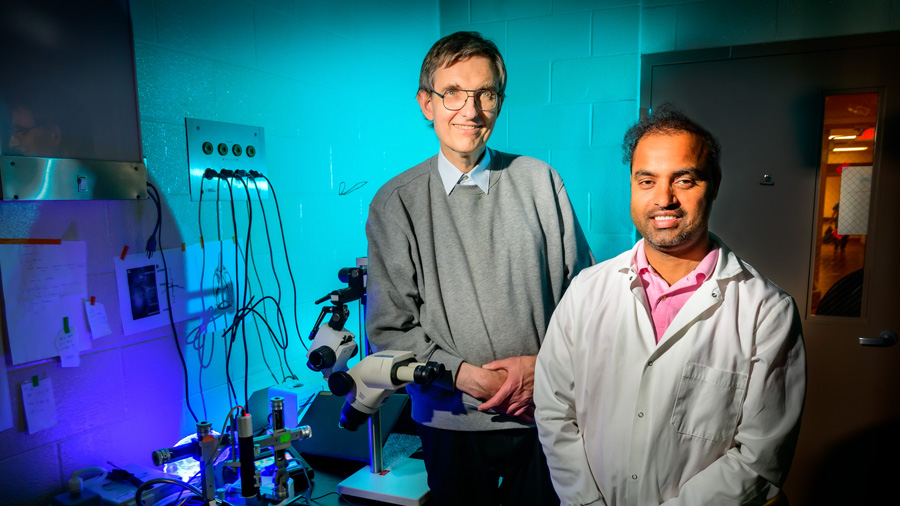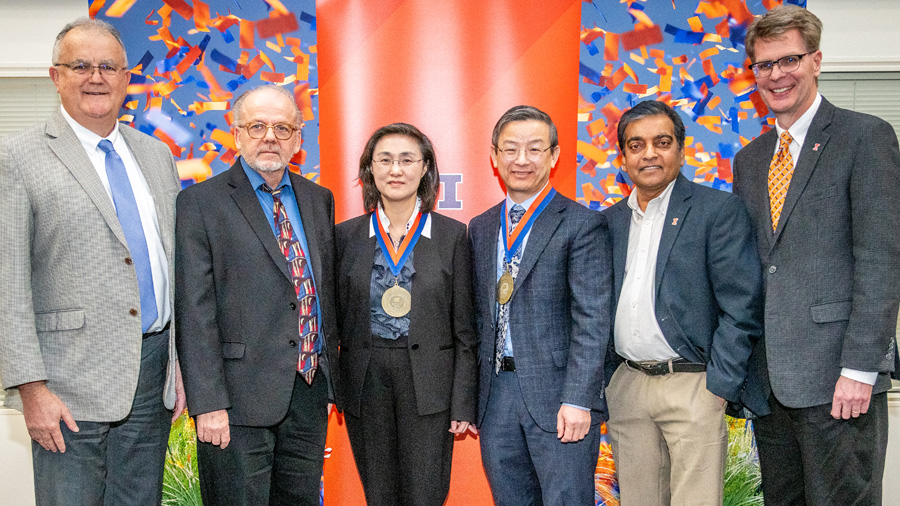Study Targets Protein Tied to Immunity
![[Som Nanjappa]](https://vetmed.illinois.edu/wp-content/uploads/2021/04/Som-Nanjappa-239x300.jpg)
Som G. Nanjappa, DVM, PhD, a faculty member in the Department of Pathobiology at the University of Illinois, was recently awarded a grant through the American Lung Association. Dr. Nanjappa’s grant is one of 98 carefully selected by the Lung Association through rigorous scientific review. In total, a $11.55 million funding commitment by the association addresses a wide range of complex issues to help combat and reduce the suffering and burden of lung disease.
Lung Infections Take Heavy Toll
Over a million people die every year from fungal diseases, mostly due to lung infections. There is no licensed vaccine available against any disease-causing fungi. Hence, it is crucial to identify potential preventive/therapeutic immune targets and understand the mechanisms that aid in the control of fungal pneumonia and restore lung health.
The lung is the most exposed and vulnerable organ in our body. The lungs are bombarded by pathogens with every breath. Understanding the mechanisms of immunity within the lung mucosa will lead to preventive and therapeutic measures against such assaults.
Dr. Som Nanjappa
Dr. Nanjappa’s group has identified a cell surface protein, Sialophorin, which orchestrates the lung’s first line of defense—innate immunity—against fungal pathogens. The research seeks to unravel the target cells and mechanisms by which Sialophorin bolsters innate immunity against pneumonia-causing pathogenic fungi. The work will help find novel preventive and therapeutic measures, and reveal Siaolophorin as a marker for assessing the clinical outcome of fungal pneumonia.
“We inhale thousand to billions of fungal spores every day. Yet most of us do not get fungal lung infections due to the innate immune system’s protective barriers. Breach of these barriers, coupled with preexisting diseases or immune deficiencies, leads to severe fungal lung infections, often resulting in deadlier disseminated diseases,” said Dr. Nanjappa.
COVID Impacts Lung Health
“COVID-19 has placed lung health at the forefront of everyone’s minds, especially for those who are concerned about air pollution, wildfires and pre-existing lung conditions such as asthma and COPD,” said American Lung Association President and CEO Harold Wimmer. “Despite the fact that the pandemic poses significant economic challenges, the American Lung Association is prioritizing research and significantly increasing award funding to help improve the lung health of all Americans.”
“The lung is the most exposed and vulnerable organ in our body,” added Dr. Nanjappa. “The lungs are bombarded by pathogens with every breath. Understanding the mechanisms of immunity within the lung mucosa will lead to preventive and therapeutic measures against such assaults. Support for lung disease research, especially during the pandemic, is vital.”
For more information about the Lung Association’s COVID-19 Research Awards and the award recipients and projects, visit: https://www.lung.org/media/press-releases/covid-19-research-awards-announced.
Featured image: H&E stained histology image of Blastomyces fungus-infected mouse lung showing numerous yeasts. Image courtesy: Dr. Miranda Vieson, DVM, PhD, DACVP, University of Illinois Veterinary Diagnostic Laboratory.

![[mouse fungal lung infections]](https://vetmed.illinois.edu/wp-content/uploads/2021/04/res-blasto-infected-lung.jpg)


